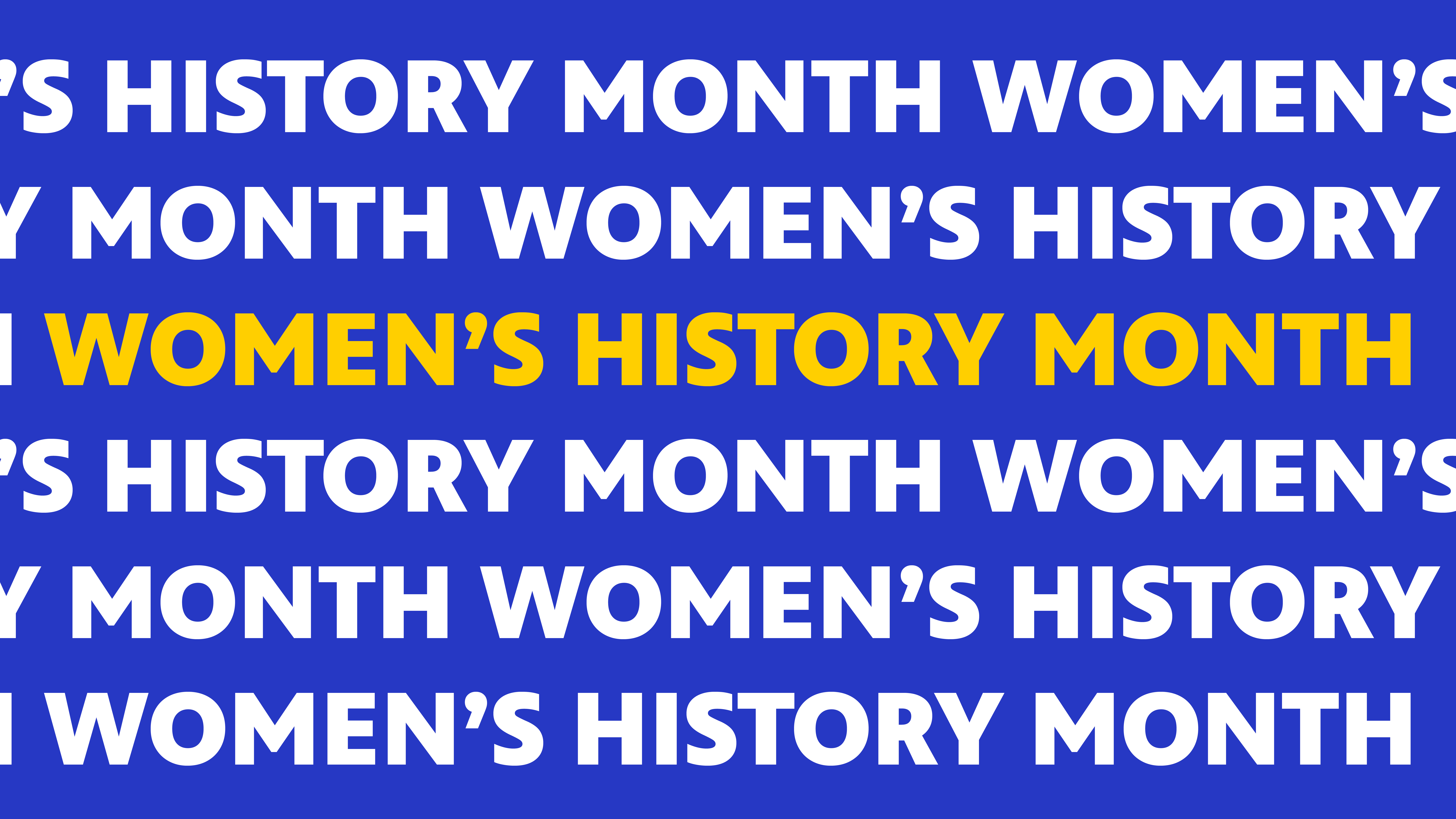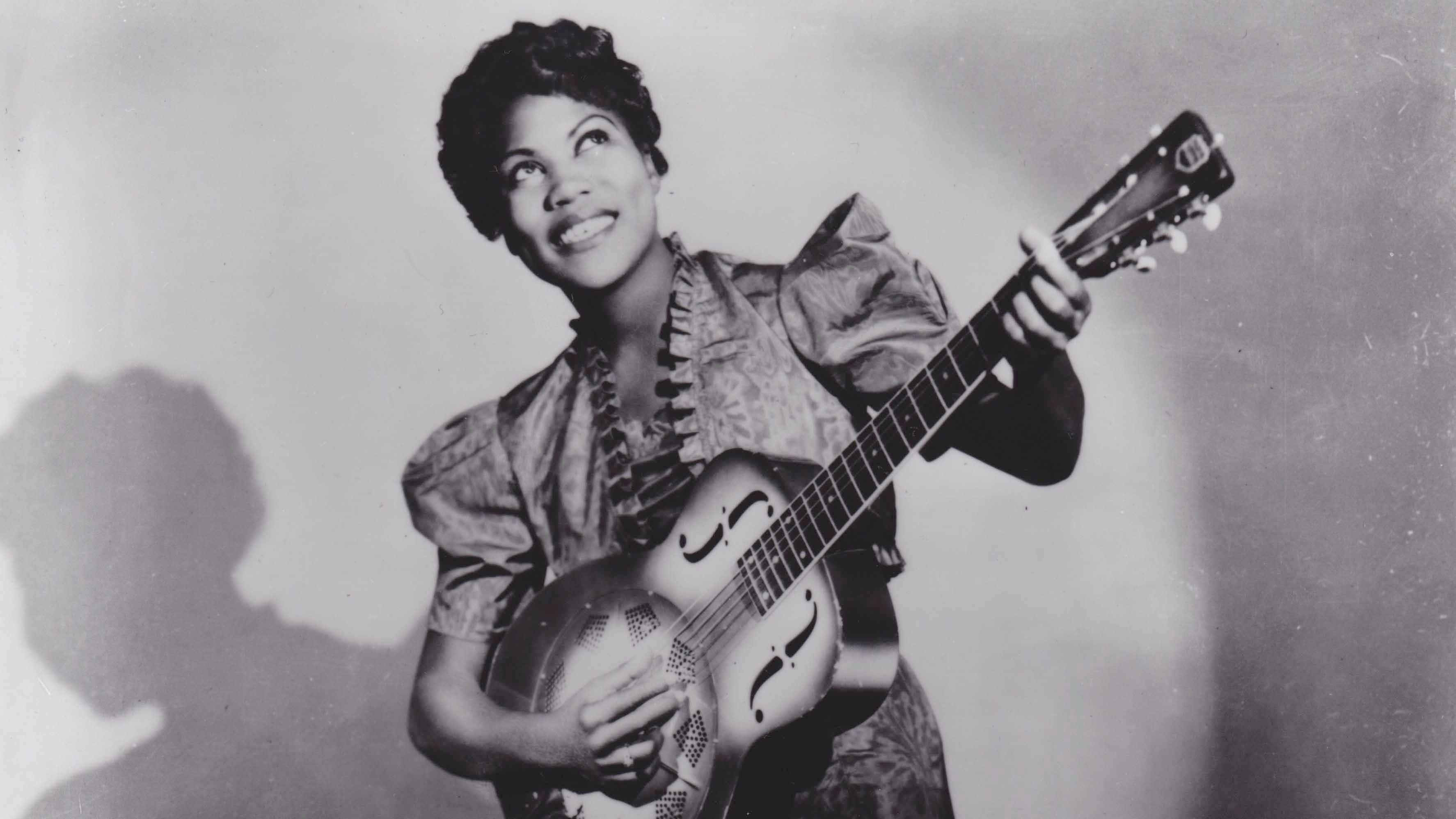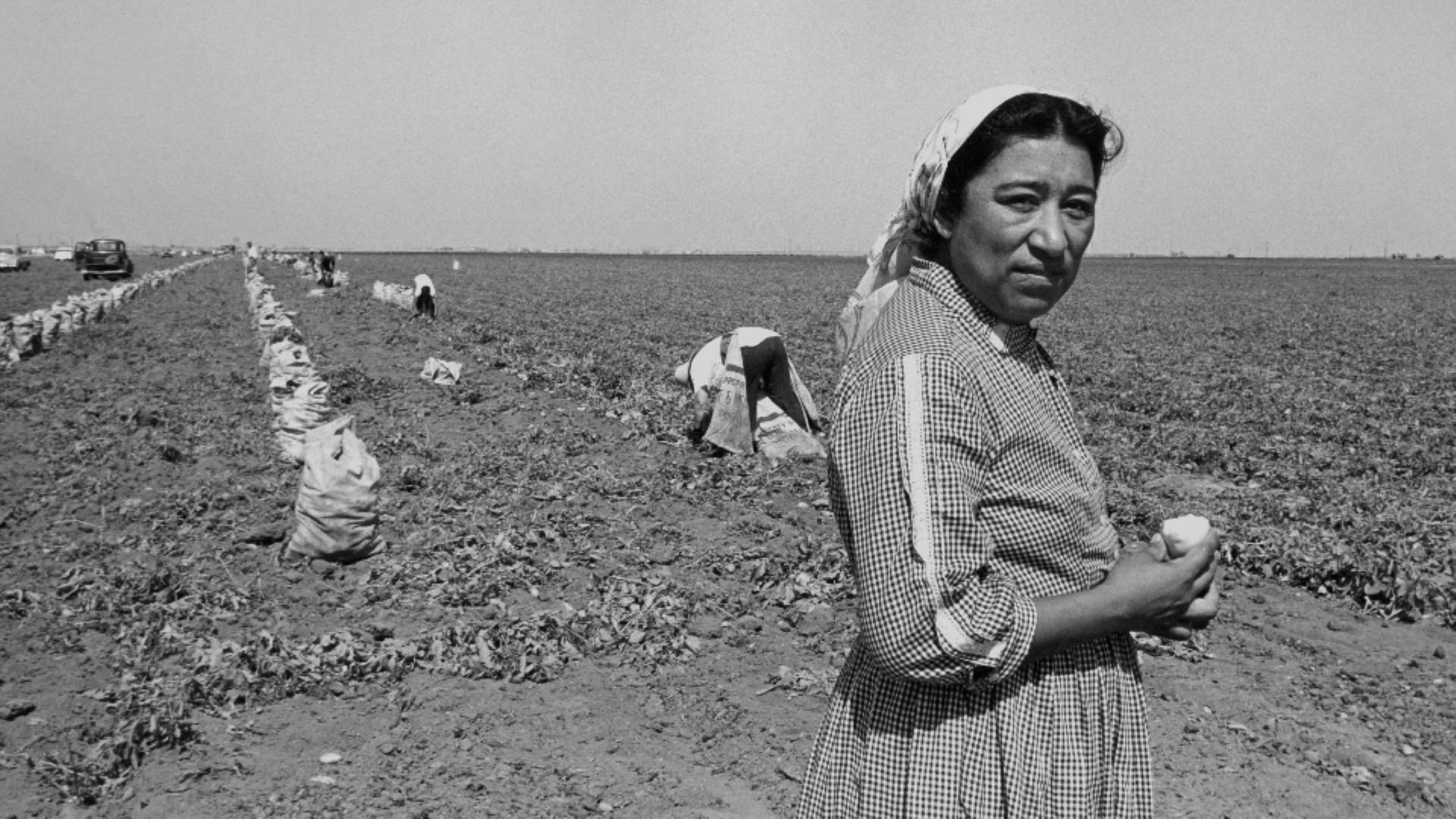Trailblazing Women in Music History You Should Know
Women's History Month, just like all the months and seasons of our lives, seems to have a soundtrack. We honor and celebrate the countless women involved in making the songs that play as we move through life.
So much of the music we know and love has been written, sung, and produced by women. Despite any attempts to minimize or erase their contributions in music, women continued to forge ahead and innovate across all the genres. Learn about 15 pioneering women who have made music history.
Sister Rosetta Tharpe
The godmother of rock n’ roll Sister Rosetta Tharpe was born March 20, 1915 in Cotton Plant, Arkansas. She grew up surrounded by music and began singing and playing the guitar in Pentecostal churches as young as 4 years old. Once she struck out on her own as a musician, she quickly her own style: a mix of Delta blues, New Orleans jazz, and gospel. In 1941 Tharpe recorded one of her best-known songs, “Strange Things Happening,” as a response to the historic events all around. It was the first gospel song to cross over into the R&B top 10 charts. She continued to blaze her own trail in music with her sound and in her personal life: she turned up the distortion on her electric guitar before any guitarist you can think of and was open about her queer sexuality. Tharpe was a daring musical innovator and an outsized influence on generations of musicians who came after her.
From American Masters: The scene is England in 1964. You hear the band playing when Sister Rosetta Tharpe pulls up on a horse drawn carriage to a make-shift stage at an abandoned railroad station. It’s a rainy day and Sister Rosetta is in her Sunday overcoat. You can almost hear a train whistle blowing when she belts out “Didn’t it Rain” accompanied by a full-blooded, swaggering electric guitar sound.
Follow American MastersMahalia Jackson
Meet the incomparable, Mahalia Jackson! Known as the Queen of Gospel, Mahalia Jackson was one of the first singers to take gospel out of the church and into the recording studio. Jackson was born in 1911 in New Orleans and went on to make her first recordings in Chicago in 1937. She combined her faith with her powerful contralto voice every time she sang, captivating audiences with every note. Her 1948 recording of “Move On Up a Little Higher” sold one million copies in the United States.
Jackson’s encounters with racism and segregation urged her to lend her voice to the Civil Rights movement as early as 1956, later singing at the 1963 March on Washington, where she encouraged Rev. Dr. Martin Luther King, Jr. to go off-script and “tell ‘em about the dream.” When she died in 1972, hundreds of musicians and politicians paid respects at two funerals in her honor. In 1997, Mahalia Jackson was posthumously inducted in to the Rock & Roll Hall of Fame.
Add to Your WatchListBuffy Sainte-Marie
Buffy Sainte-Marie is an artist who has expanded genres and broken barriers in all of them. In folk music, she wrote anthems that have withstood the test of time. On Sesame Street, she was the show's first Indigenous actor and the first woman to breastfeed her child on screen. Sainte-Marie's 1983 Oscar win for Best Original Song (An Officer and a Gentleman's "Up Where We Belong") made her the first Indigenous woman to win an Oscar.
Buffy Sainte-Marie was born February 20, 1941, and we hope she never stops innovating, writing, creating, and being herself.
Add to Your WatchListLinda Ronstadt
Linda Ronstadt made music history when she released “Canciones de Mi Padre” in 1987. At the time, Ronstadt had already dominated the rock scene, the country scene, and the all the good-music-worth-listening-to scene. She demonstrated how someone could show all the different parts of themselves with pride when she put her Mexican heritage on display and recorded the Spanish-language mariachi album. If she was ever considered a mere pop singer, her ear for good songs in across rock, pop, country, and folk dispelled that notion. Her ability to move in and out of genres, to work with the best artists in the business, to pour lyrics directly into our hearts when she sang, and to insist on making music that represented all of her culture is why we love her. Oh, and that album of traditional Mexican songs, "Canciones de Mi Padre," went double platinum, selling over 2.5 million copies and won a Grammy Award. It remains the top selling non-English language album in U.S. history.
In this 2020 tribute concert from Southland Sessions, Ronstadt's hits are sung by artists she influenced, including La Marisoul and Aida Cuevas.
Add to Your WatchList
The best of PBS, straight to your inbox.
Be the first to know about what to watch, exclusive previews, and updates from PBS.
Lea Salonga
Lea Salonga was just 20 years old when she won a Tony Award for her performance as Kim in the original Broadway production of Miss Saigon. It was 1991 and Salonga's win marked the first time an Asian actress won a Tony. Broadway is just one of the places where Salonga, who was born in Manila, Phillippines, has made her mark.
She started her professional acting and singing career as a young child. In the more than four decades that she has been performing with her powerful voice and perfect pitch, she has earned dozens of awards and captivated audiences all over the world. She has been the voice of princesses and warriors and sisters and mothers. In her own voice, Salonga has consistently emphasized the importance of diverse representation in media and used her platform for philanthropy.
Add to Your WatchListSupport your local PBS station in our mission to inspire, enrich, and educate.
Peppermint
Peppermint is an actress, singer, songwriter, television personality and all-around star. While she has been performing since she was a child in youth theatre productions, Peppermint made history in 2018 by being the first trans woman to play a lead in a Broadway musical. She originated the lead role of Pythio in Head Over Heels that year. And she hasn’t stopped being a wonderful diva since that milestone.
Among other projects, Peppermint hosted the American Masters collection, Masters of Drag, in which she explored the history of drag culture and the lives of American drag pioneers. And on top of all that, she is a dedicated advocate for meaningful queer representation in media. We celebrate Peppermint’s place in music history, and we hope she stays in the spotlight.
Sylvia Robinson
Sylvia Robinson made music history in 1979 when she assembled a rap group in the studio to record what would become the first commercially successful rap record. Sugarhill Gang's "Rapper's Delight" was a huge radio hit, crossing over to the R&B Hot 100 charts and selling over 1 million copies. She demonstrated with one record that the nascent genre could have as much commercial success as any contemporary musical genres. Her label, Sugarhill Records, was a major creative force in those early years and she produced seminal records, such as "The Message" by Grandmaster Flash & The Furious Five, and pioneering acts like The Funky 4 + 1.
Robinson was hardly new to the music industry when she formed Sugarhill Records with her husband, Joe Robinson. She was a successful singer, songwriter, and producer even if she wasn't always credited for her work. Hip hop cemented Robinson's place in music history while her pioneering work elevated the genre and helping to kick off hip hop's global rise.
MC Sha-Rock
Meet the Mother of the Mic, the First Lady of Hip Hop: Sharon Green, also known as MC Sha-Rock. She is widely considered to be the first female emcee in hip hop, making her own way since the early days of hip hop. Born in 1962, she was raised in the South Bronx and joined the hip hop group called the Funky Four when she was a teenager in 1976. After her formal addition to the group, they became known as the Funky Four +1. The group went on to become the first hip hop group to perform on national television when they were the musical guests on a 1981 episode of Saturday Night Live. MC Sha-Rock’s unique rhyming style and pioneering use of the “echo chamber,” where the words or phrases would be repeated for emphasis, heavily influenced the next generation of rappers and paving the way for countless hip hop legends.
Here is a 2021 interview with ABC News about MC Sha-Rock's impact on artists and her key role in hip hop history:
Missy Elliott
Missy Elliott is multi-talented artist who paved the way for many others with her strong cultural impact. As a rapper, songwriter, and producer she has created a legacy for herself beyond compare. Born on July 1, 1971, Elliott was already writing hit songs in the 1990s (remember One in a Million, the Aaliyah track that Missy wrote?) then took hip hop sound and visual artistry to another level with her debut album "Supa Dupa Fly" in 1997. Elliott continued to innovate in her recordings and her music video concepts since, inspiring countless other hip hop artists. She's inspired so many of us, we even commissioned artist Pope Phoenix to make a portrait of the one and only Missy Elliott.
And can we talk about her work as it relates to Afrofuturism? Yes, Say It Loud makes the case, convincingly.
Add to Your WatchListCelia Cruz
Celia Cruz was born in Havana, Cuba in 1925, where she studied to be a teacher. Cruz sang for radio stations to earn money during her schooling and she later became the lead singer of the country’s most popular orchestra, La Sonora Matancera. After she moved to the U.S. in 1961, Cruz connected with salsa musicians and musical innovators and put her own stamp on the music scene with her energy and unique voice. Her sound was rooted in the Yoruba music she grew up with and her on-stage personality imparted a knowingness about overcoming life’s challenges to any song lyrics.
When she passed away in 2003, she had recorded over 80 albums, earned 23 gold records, won five Grammy awards, and received the president’s National Medal of Arts. Celia Cruz was one of the greatest performers of the 20th century, famous for interjecting a lively “Azucar!” as she sang, and the undisputed “Queen of Salsa.” She’ll soon make history again, when she’ll be featured on the U.S. quarter, making her the first Afro-Latina to appear on the coin.
Gloria Estefan
Gloria Estefan received the 2019 Library of Congress Gershwin Prize for Popular Song, along with her husband and musical collaborator Emilio Estefan. But long before that, Estefan made her mark on musical history, popular culture, and every party we've ever been to.
Born Gloria María Milagrosa Fajardo García in Cuba, on September 1, 1957. She was the lead singer of the Miami Sound Machine, the group with which she became a global superstar. She gave us iconic chart-topping songs like "Conga," "Get On Your Feet," "Turn the Beat Around" and "Rhythm is Going to Get You" in the 1980s. She went on to record several Spanish-language albums, sharing even more of her Cuban musical roots, drawing from Yoruba and Carribbean music. In 2015, Estefan's music and life inspired the musical "On Your Feet:" it debuted on Broadway in 2015. We can't wait to see where Estefan's music takes us next.
Ivy Queen
Long before reggaeton music was coming through everyone's speakers, Ivy Queen was writing lyrics and performing in the Puerto Rico's underground rap scene. She was the only woman at the time, and remained the only woman for years in the emerging reggaeton genre. She was already known as the Queen of Reggaeton when she wrote and recorded the club anthem "Yo Quiero Bailar" in 2003. That smash hit single was part of a wave of music that helped reggaeton go global.
Ivy Queen is called by many names: La Caballota, La Diva, La Gata, but she was born Martha Ivelisse Pesante on March 4, 1972, in Puerto Rico and raised in New York City. She continues to make music and use her powerful voice to uplift and empower women. Her powerful voice and lyrical style has influenced contemporary artists like Karol G, Bad Bunny, and Cardi B. She spoke about the importance of being first and helping those who come next during the 2021 Hispanic Heritage Awards. We are here for the Queen of Reggaeton.
Add to Your WatchListSissieretta Jones
In 1892, Sissieretta Jones became the first Black woman to headline at New York’s Carnegie Hall. Born in Portsmouth, Virginia in 1868, Jones’s incredible vocal talent was noticed early when she sang in the church where her father was the minister. Jones pursed additional vocal training at the New England Conservatory of music and began performing to great acclaim across New England with the Fisk Jubilee singers. Although there are no known recordings of the trailblazing American soprano’s voice, newspapers were filled with glowing reviews and descriptions of her powerful and emotive performances. Jones spent much of her career performing operatic arias and around the world, impressing audiences that ranged from emperors and royals abroad to four Presidents here in the U.S. Jones truly enriched the world of opera, and is still remembered as the greatest singer of her generation and one of the greatest voices of all time.
Add to Your WatchListZitkála-Šá
Zitkála-Šá, also known as Gertrude Simmons Bonnin, was born in 1876 on the Yankton Reservation in South Dakota. At age 8, she left the reservation to attend a boarding school. That experience was formative for her, and she spent the rest of her life advocating for Indigenous rights and published several exposes of the horrors of Indian boarding schools in 1900. She then went on to write the first Native opera in 1913: called "The Sun Dance Opera." It was an attempt to preserve cultural songs and traditions, though the ouevre received criticism for potentially sharing closed practices.
Šá also co-founded the National Council of American Indians to lobby for increased political power for Native and Indigenous people, fighting for voting rights for all Native people and raising awareness of land loss and human rights for all Indigenous people.
Add to Your WatchListMarian Anderson
Marian Anderson was born on February 27, 1897 in South Philadelphia, Pennsylvania. Anderson's vocal talent was apparent even as a child when she sang in church with her sisters. In 1919 she enrolled in a six-week opera course at the Chicago Conservatory of Music, during which she witnessed the racial violence later known as "Red Summer."
Her singing career kept advancing and in 1925 she became the first African American singer to sign with RCA Victor Recording Company. She traveled the world performing for royals and dignitaries and in storied venues like New York's Carnegie Hall. On Easter Sunday in 1939, she performed before an integrated audience of over 75,000 people at the Lincoln Memorial in Washington, D.C.
Add to Your WatchList


